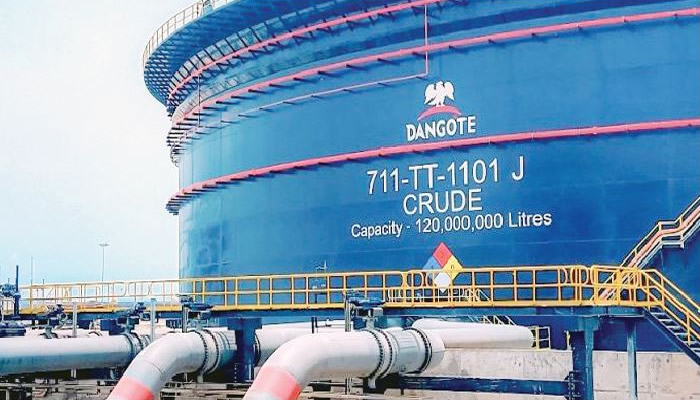The Dangote Refinery has confirmed plans to begin a free fuel distribution scheme starting Monday, September 15, as part of a broader effort to cushion the impact of high living costs on Nigerians. The initiative will roll out initially in Lagos, Abuja, Kwara, Delta, Rivers, Edo, and other South-West states before gradually expanding nationwide.
According to company officials, the refinery will not only distribute fuel free of charge in some communities but also slash retail pump prices in several states. In Lagos and other South-West states, petrol will sell at ₦841 per litre, while Abuja, Edo, Kwara, Rivers, and Delta will see prices at ₦851 per litre. This marks a significant reduction compared to prevailing market rates and is expected to bring much-needed relief to motorists, commuters, and businesses.

The free distribution programme, described as part of the refinery’s corporate social responsibility agenda, is also designed to reassure Nigerians of the benefits of local refining. For months, citizens have expressed frustration over rising fuel prices, even after the Dangote Refinery commenced operations. By reducing pump prices and offering free allocations, the company is aiming to restore confidence and demonstrate goodwill at a time of economic strain.
The refinery has already deployed over 1,000 compressed natural gas (CNG) powered trucks to support the distribution network. These trucks are expected to make transportation of refined products more efficient and cheaper while reducing environmental impact. As more trucks arrive in the coming weeks, the company intends to expand coverage to additional states, ensuring a broader national reach.
Filling station owners and bulk fuel consumers have been invited to register to participate in the scheme, further widening access. Dangote officials noted that the scheme had originally been scheduled to commence in August but was delayed due to logistical setbacks, including equipment and shipment delays from overseas. The refinery says these challenges have now been resolved, allowing the long-awaited rollout to move forward.
Industry analysts say the introduction of CNG trucks signals a strategic shift in Nigeria’s petroleum logistics. Not only will it reduce transport costs, but it also reflects a commitment to cleaner energy alternatives, a move that aligns with global trends toward sustainability. This innovation could set a new standard for fuel distribution in the country, particularly if adopted widely by other players in the downstream sector.
For ordinary Nigerians, the initiative could not have come at a more critical time. Since the removal of petrol subsidies in 2023, the price of fuel has surged, pushing up transport fares, food costs, and general inflation. Small and medium-sized enterprises, which rely heavily on diesel and petrol to power generators and logistics operations, have been especially hard hit. By temporarily easing fuel costs, the Dangote initiative promises direct savings for households and businesses alike.
Transport unions and community leaders have already expressed optimism. Representatives of the National Union of Road Transport Workers (NURTW) welcomed the programme, saying cheaper or free fuel would directly reduce fares, benefiting millions of commuters who struggle daily with high costs. Community leaders in Lagos, Ogun, Delta, and Edo also praised the move, noting that it could ease tensions and strengthen relations between the refinery and its host communities.
Government officials have reacted cautiously but positively to the development. While the Ministry of Petroleum Resources has yet to issue a formal statement, insiders suggest the initiative is being viewed as complementary to policy measures aimed at stabilizing fuel supply and reducing inflationary pressures.
However, experts caution against seeing the scheme as a permanent solution. While free fuel distribution and temporary price reductions provide relief, Nigeria still faces structural challenges in its energy sector. Exchange rate volatility, global crude oil dynamics, and domestic infrastructure bottlenecks all continue to play a role in pricing. Economists stress the importance of reforms in energy pricing, stronger competition in the downstream sector, and diversification into renewable energy sources.
Still, the symbolism of the scheme is powerful. Dangote Refinery, widely touted as Africa’s largest single-train refinery with a capacity of 650,000 barrels per day, is positioning itself not just as a commercial enterprise but as a national partner in tackling economic hardship. By absorbing significant costs in the short term, it is signaling its readiness to play a stabilizing role in Nigeria’s energy landscape.
Nigerians have responded with cautious optimism. On social media, some have hailed the programme as a “people’s bailout,” while others remain skeptical about its duration and impact. Key questions include how long the free distribution will last, how much volume will be made available, and whether the reduced pump prices can be sustained over time.
Despite these uncertainties, the launch of the scheme is expected to ease pressure on households and businesses, at least in the short run. If implemented efficiently and transparently, it could set a precedent for greater private-sector involvement in addressing public welfare issues during economic crises.
As Monday approaches, all eyes will be on how smoothly the initiative is executed. Success could strengthen public trust in the refinery and validate the broader push for local refining as a solution to Nigeria’s fuel challenges. If mishandled, however, it risks fueling more skepticism at a time when public confidence is already fragile.
For now, Nigerians are hopeful. In a period marked by rising costs and economic uncertainty, the promise of free and cheaper fuel—even if temporary—offers a rare opportunity for relief. More than just a corporate gesture, it may well represent the beginning of a new era in how energy is delivered and consumed in Africa’s largest economy.
Support InfoStride News' Credible Journalism: Only credible journalism can guarantee a fair, accountable and transparent society, including democracy and government. It involves a lot of efforts and money. We need your support. Click here to Donate
